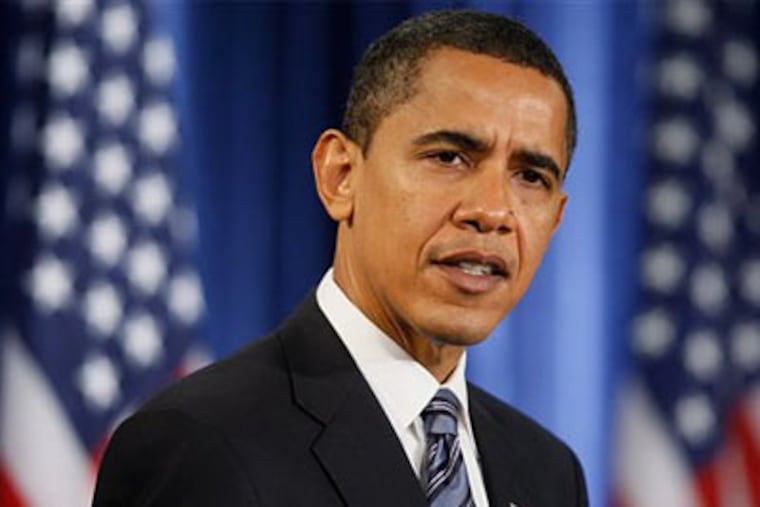Ill. scandal a test for Obama
His transition team's response may have been too cautious and slow.

President-elect Barack Obama's response to Illinois Gov. Rod R. Blagojevich's alleged effort to sell his old Senate seat grew steadily more specific last week, but it might not have been enough to blow away the stink.
The scandal was a major test of the Obama team's ability to manage a media firestorm that threatened to tarnish his political image as a reformer, while continuing to assemble an administration and attempt to shape economic policy.
Obama reacted tentatively at first and then with surer footing over three days, an evolution that mirrored how he handled other controversies during the campaign.
But some, including Pennsylvania Gov. Rendell, say that approach might not work so well on the presidential stage.
At the end of the week there were lingering questions about whether Obama's staff had contact with Blagovjevich, a rare blemish on an transition process that even Republicans have called near-flawless.
"They have never been in an executive position before," Rendell said Friday on MSNBC's Morning Joe program. "The rule of thumb is whatever you did, say it and get it over with and make it a one-day story as opposed to a three-day story. Politicians are always misjudging the intelligence of the American people."
Rendell said that "of course" Obama's people must have talked with Blagojevich, saying one possible point of contact is chief of staff Rahm Emanuel, who succeeded the Illinois governor in Congress. Later, Rendell said he did not mean to suggest the president-elect or advisers did anything substantively wrong. He instead said was criticizing how the transition office handled media inquiries on the topic.
At first, Obama was vague, saying Tuesday that he was sobered by Blagojevich's arrest, had not discussed the Senate seat with him and would not comment on an ongoing federal criminal investigation. The next day, he said through a spokesman that Blagojevich should resign, but did not address questions about staff communications with the governor.
On Thursday, Obama pledged during a news conference (ostensibly about health care) that he would investigate and release all the contacts his staff had with the governor "in the next few days." He also expressed his personal outrage at the allegations and declared he was "absolutely certain" no one from his office had any involvement in deal-making about his successor.
The sequence was reminiscent of Obama's reaction to controversy earlier this year over incendiary remarks by Rev. Jeremiah Wright Jr., his former pastor. Among other things, Wright spoke of the "U.S. of KKK," said "God damn America" and said the 9/11 terrorist attacks represented "chickens coming home to roost" for America's racial sins.
Obama initially said he never heard Wright say anything objectionable; later made a highly regarded speech on race in Philadelphia that sought to put the minister's remarks in the context of black anger at racism; and finally disavowed the man.
In the summer, Obama came under political fire after reacting to Russia's military incursion into Georgia by calling for both sides to cool down. He later stepped up his criticism of Russia.
"Obama is a very very cautious person, which is somewhat surprising given the insurgent nature of his candidacy," said Larry Sabato, a professor at the University of Virginia who has written extensively about media-driven scandals in politics. "But caution might be a good thing in a president," Sabato said. "He is benefiting from a contrast with Bush."
Sabato added that the only thing that could cause serious damage to the incoming administration would be if an important adviser - such as Emanuel or strategist David Axelrod - were caught up in the scandal.
In general, though, polls indicate the Obama transition has been well received. Though he does not yet have the constitutional authority or the "football" briefcase of nuclear codes, Obama has already seized the bully pulpit of the presidency, especially on the economy. In the last week of November, for instance, he held three televised news conferences in a row aimed at reassuring the jittery markets with promises of an economic stimulus plan. On Dec. 1, Obama met with the nation's governors in Philadelphia to discuss possible federal aid to states.
The most recent NBC/Wall Street Journal Poll last week found Obama enjoying a sweeter honeymoon than his two immediate predecessors did during their transitions. Sixty-seven percent told pollsters they approve of Obama's appointments so far; 75 percent believe that his efforts to shape economic policy have been appropriate; and only 16 percent regard him unfavorably.